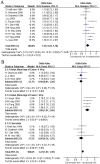Angiotensin-converting enzyme (ACE) gene insertion/deletion polymorphism and ACE inhibitor-related cough: a meta-analysis
- PMID: 22723835
- PMCID: PMC3378563
- DOI: 10.1371/journal.pone.0037396
Angiotensin-converting enzyme (ACE) gene insertion/deletion polymorphism and ACE inhibitor-related cough: a meta-analysis
Abstract
Objective: An insertion/deletion (I/D) variant in the angiotensin-converting enzyme (ACE) gene was associated with ACE inhibitor (ACEI)-related cough in previous studies. However, the results were inconsistent. Our objective was to assess the relationship between the ACE I/D polymorphism and ACEI-related cough by meta-analysis and to summarize all studies that are related to ACE I/D polymorphism and ACEI-cough and make a summary conclusion to provide reference for the researchers who attempt to conduct such a study.
Methods: Databases including PubMed, EMbase, Cochrane Library, and China National Knowledge Infrastructure, were searched for genetic association studies. Data were extracted by two independent authors and pooled odds ratio (OR) with 95% confidence interval (CI) was calculated. Metaregression and subgroup analyses were performed to identify the source of heterogeneity.
Results: Eleven trials, including 906 cases (ACEI-related cough) and 1,175 controls, were reviewed in the present meta-analysis. The random effects pooled OR was 1.16 (95%CI: 0.78-1.74, p=0.46) in the dominant model and 1.61 (95%CI: 1.18-2.20, p=0.003) in the recessive model. Heterogeneity was found among and within studies. Metaregression indicated that the effect size was positively associated with age and negatively associated with follow-up duration of ACEI treatment. Subgroup analysis revealed a significant association between ACE I/D polymorphism and ACEI-related cough in studies with mean age >60 y, but not in studies with mean age ≤ 60 y. No heterogeneity was found within each mean age subgroup. We also found no association between ACE I/D polymorphism and ACEI-related cough in studies with follow-up>2 mo or in studies in Caucasians. No heterogeneity was detected in these two subgroups.
Conclusions: Synthesis of the available evidence supports ACE I/D polymorphism as an age-dependent predictor for risk of ACEI-related cough.
Conflict of interest statement
Figures




References
-
- The SOLVD Investigators. Effect of enalapril on survival in patients with reduced left ventricular ejection fractions and congestive heart failure. N Engl J Med. 1997;325:293–302. - PubMed
-
- The Acute Infarction Ramipril Efficacy (AIRE) Study Investigators. Effect of ramipril on mortality and morbidity of survivors of acute myocardial infarction with clinical evidence of heart failure. Lancet. 1993;342:812–828. - PubMed
-
- The CONSENSUS Trial Study Group. Effects of enalapril on mortality in severe congestive heart failure: results of the Cooperative North Scandinavian Enalapril Survival Study (CONSENSUS). N Engl J Med. 1987;316:1429–1435. - PubMed
-
- Pfeffer MA, Braunwald E, Moyé LA, Basta L, Brown EJ, Jr, et al. Effects of captopril on mortality and morbidity in patients with left ventricular dysfunction after myocardial infarction. Results of the Survival and Ventricular Enlargement Trial. The SAVE Investigators. N Engl J Med. 1992;327:669–677. - PubMed
-
- Guidelines Subcommittee. World Health Organization-International Society of Hypertension Guidelines for the Management of Hypertension. J Hypertens. 1999;17:151–183. - PubMed
Publication types
MeSH terms
Substances
LinkOut - more resources
Full Text Sources
Medical
Miscellaneous

